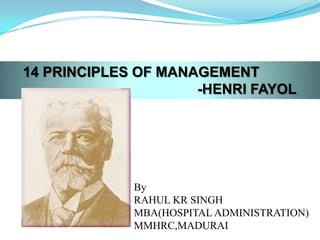
14 Principles Of Management
- 1. 14 PRINCIPLES OF MANAGEMENT -HENRI FAYOL By RAHUL KR SINGH MBA(HOSPITAL ADMINISTRATION) MMHRC,MADURAI
- 2. INTRODUCTION A principle refers to a fundamental truth. It establishes cause and effect relationship between two or more variables under given situation. They serve as a guide to thought & actions. These principles are derived: - •On the basis of observation and analysis •By conducting experimental studies
- 3. 14 PRINCIPLES OF MANAGEMENT DESCRIBED BY HENRI FAYOL Division of Labor Party of Authority & Responsibility Principle of One Boss Unity of Direction Equity Order Discipline
- 4. 14 PRINCIPLES OF MANAGEMENT DESCRIBED BY HENRI FAYOL Initiative Fair Remuneration Stability of Tenure Scalar Chain Sub-Ordination of Individual Interest to General Interest Espirit De’ Corps Centralization & De-Centralization
- 5. DIVISION OF LABOUR stressed on the specialization of jobs work of all kinds must be divided and allotted to various persons simpler and results in efficiency helps the individual in acquiring speed, accuracy in his performance Specialization leads to efficiency & economy in spheres of business
- 6. Party of Authority & Responsibility co-existing Authority is given to a person, he should also be made responsible. He should also have concerned authority, if anyone is made responsible. Authority refers to the right of superiors. responsibility means obligation for the performance of the job assigned. Should be a balanced. Authority- Responsibility = Irresponsible Behavior Responsibility- Authority= Ineffective
- 7. Principle of One Boss A sub-ordinate should receive orders and be accountable to only boss at a time. a sub-ordinate should not receive instructions from more than one person Dual sub-ordination should be avoided The enterprise a disciplined, stable & orderly existence Harmonious relationship between superiors and sub-ordinates a sub-ordinate should not receive instructions from more than one person
- 8. UNITY OF DIRECTION One head one plan Related activities should be grouped together Efforts of all the members of the organization should be directed towards common goal Without unity of direction, unity of action cannot be achieved. Unity of command is not possible without unity of direction.
- 9. Order • Concerned with proper & systematic arrangement of things and people. • Arrangement of things is called material order • Placement of people is called social order. • Material order-should be safe, appropriate and specific place for every article • Social order-Selection and appointment of most suitable person on the suitable job
- 10. Discipline Sincerity, Obedience, Respect of Authority & Observance of Rules and Regulations of the Enterprise. subordinate should respect their superiors and obey their order. smooth running of the enterprise subordinates but also on the part of management. Discipline can be enforced if - -Good superiors - Clear & fair agreements with workers - Sanctions are judiciously applied
- 11. INITIATIVE Encouraged to take initiative in the work assigned to them Initiate actions without being asked to do Management should provide opportunity to its employees Helps in developing an atmosphere of trust Enjoy working in the organization because it adds to their zeal and energy Suggest improvement in formulation & implementation of place
- 12. Fair Remuneration Paid to the workers should be fair of the efforts Satisfaction to both employer and the employees Determined on the basis of cost of living, work assigned etc, Provision of other benefits such as free education, medical & residential facilities to workers Management creates harmonious relationship and pleasing atmosphere of work.
- 13. Stability of Tenure Employees should not be moved frequently from one job position to another Once they are appointed their services should be served Time is required for an employee to get used to a new work –fayol Money spent on training the worker will go waste Stability of job creates team spirit& a sense of belongingness among workers -ultimately increase the quality as well as quantity of work
- 14. Scalar Chain The chain of superiors ranging from the ultimate authority to the lowest Every orders, instructions etc. has to pass through Scalar chain. For the sake of convenience & urgency, this path can be cut this short cut -Gang Plank Temporary arrangement between two different points to facilitate quick & easy communication Modified as per the requirements of situations.
- 15. Sub-Ordination of Individual Interest to General Interest An organization is much bigger than the individual As far as possible, reconciliation should be achieved between individual and group interests. Case of conflict, individual must sacrifice for bigger interests In order to achieve this attitude - Employees should be honest & sincere. - Proper & regular supervision of work. - Reconciliation of mutual differences
- 16. Espirit De’ Corps It refers to team spirit Inspires workers to work harder Interest of the undertaking in the long run. The managers should infuse team spirit & belongingness Espirit De’ Corps following steps should be undertaken proper co-ordination should be encouraged to develop informal relations among themselves. create enthusiasm and keenness among subordinates employees should be rewarded
- 17. Centralization & De-Centralization Centralization-concentration of authority at the top level De-centralization-disposal of decision making authority to all the levels of the organization Increases the role of subordinate is decentralization & Decreases the role of subordinate is centralization It is not feasible, organization should strike to achieve a lot between the two.
- 18. IT’S QUERY TIME
- 19. THANK YOU
Editor's Notes
- By N.VIDIVARASI 1ST MBA
- INTRODUCTION
- InitiativeFair RemunerationStability of TenureScalar ChainSub-Ordination of Individual Interest to General InterestEspirit De’ Corps (can be achieved through unity of commandCentralization & De-Centralization
- InitiativeFair RemunerationStability of TenureScalar ChainSub-Ordination of Individual Interest to General InterestEspirit De’ CorpsCentralization & De-Centralization
- proper co-ordination should be encouraged to develop informal relations among themselves. create enthusiasm and keenness among subordinates employees should be rewarded
- Centralization